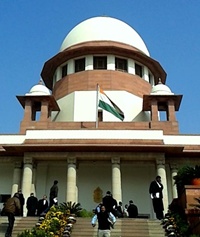Centre to set up 12 special courts to expedite cases against politicians
13 Dec 2017
The Union government on Tuesday told the Supreme Court it would set up at least 12 special courts for faster disposal of 1,571 criminal cases pending against lawmakers.
 The ministry of law and justice, in an affidavit filed in pursuance of an SC order asking it to come up with a scheme to set up special courts to deal with cases involving lawmakers, said it has allotted Rs7.8 crore for the purpose.
The ministry of law and justice, in an affidavit filed in pursuance of an SC order asking it to come up with a scheme to set up special courts to deal with cases involving lawmakers, said it has allotted Rs7.8 crore for the purpose.
Filing the affidavit, additional secretary in the law ministry Justice Reeta Vasishta informed a bench headed by Justice Ranjan Gogoi that the scheme envisages constitution of the courts for a period one year for now.
''Twelve special courts for a period of one year" shall be set up to dispose of cases against politicians, the affidavit states adding that this scheme was given in-principle approval by the Ministry of Finance on 8 December with a budget of Rs7.8 crore.
They are based on the 11th Finance Commission report, which found that one such court can dispose 165 cases per year, and suggested that trials in states with fewer than 65 cases can be completed in existing Fast Track Courts.
The ministry also states that the formation of the special courts will be done after detailed consultation with state governments on the basis of the number of pending trials they have.
The apex court had on 1 November directed the Centre to place before it details regarding 1,581 cases involving MPs and MLAs, as declared by the politicians at the time of filing their nominations during the 2014 general elections. It had asked the government to apprise it of how many of these cases have been disposed of within one year and how many have ended in either conviction or acquittal.
The government's affidavit has said that the figure of 1,581 cases has been obtained from a non-government organisation but the data as to in which courts these cases are pending is not available.
"It is difficult to gather the facts and figures required for the purpose of answering the queries mentioned in the order of the court.
"Since the states in which these cases are pending is available, the ministry has initiated action by seeking to collect the requisite details from the respective state governments," the affidavit said.
It said the Centre has sought information from various high courts, and their responses are awaited.
The aim of creating special courts is to ensure that the politicians with criminal backgrounds are not able to delay trials, and those facing false cases get justice.
At present, a politician is disqualified immediately from contesting elections for six years if sentenced to a jail term of two years or more.
The affidavit came while the court was hearing a Public Interest Litigation filed by advocate Ashwani Upadhyay, affiliated with the Bharatiya Janata Party. He sought that the provisions of the Representation of People (RP) Act, which bars convicted politicians from contesting elections for six years after serving a jail term, should be declared as ultra vires of the Constitution. Several others have come to the apex court as interveners.
According to data submitted in the Court by NGO Association of Democratic Reforms (ADR), affidavits by politicians at the time of submitting nomination papers for the 2014 general elections and Assembly polls had disclosed 1,581 cases were pending against them. Ten cases were later dropped due to the death of the politicians concerned.
The affidavit stated, ''We had tried to get the information from the election watchdog, which expressed its inability to provide the data. Even the NGO that provided the figure did not have the information. Quarterly reports will be submitted in the top court which would also state as to how many criminal cases have been disposed of in one year.''



















